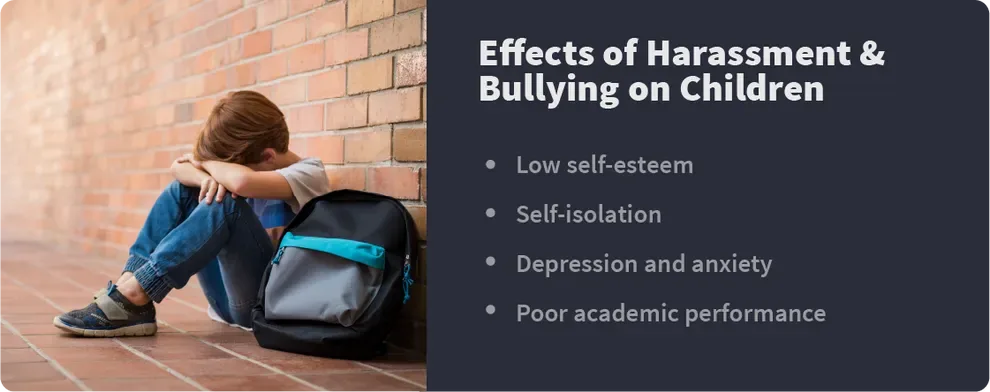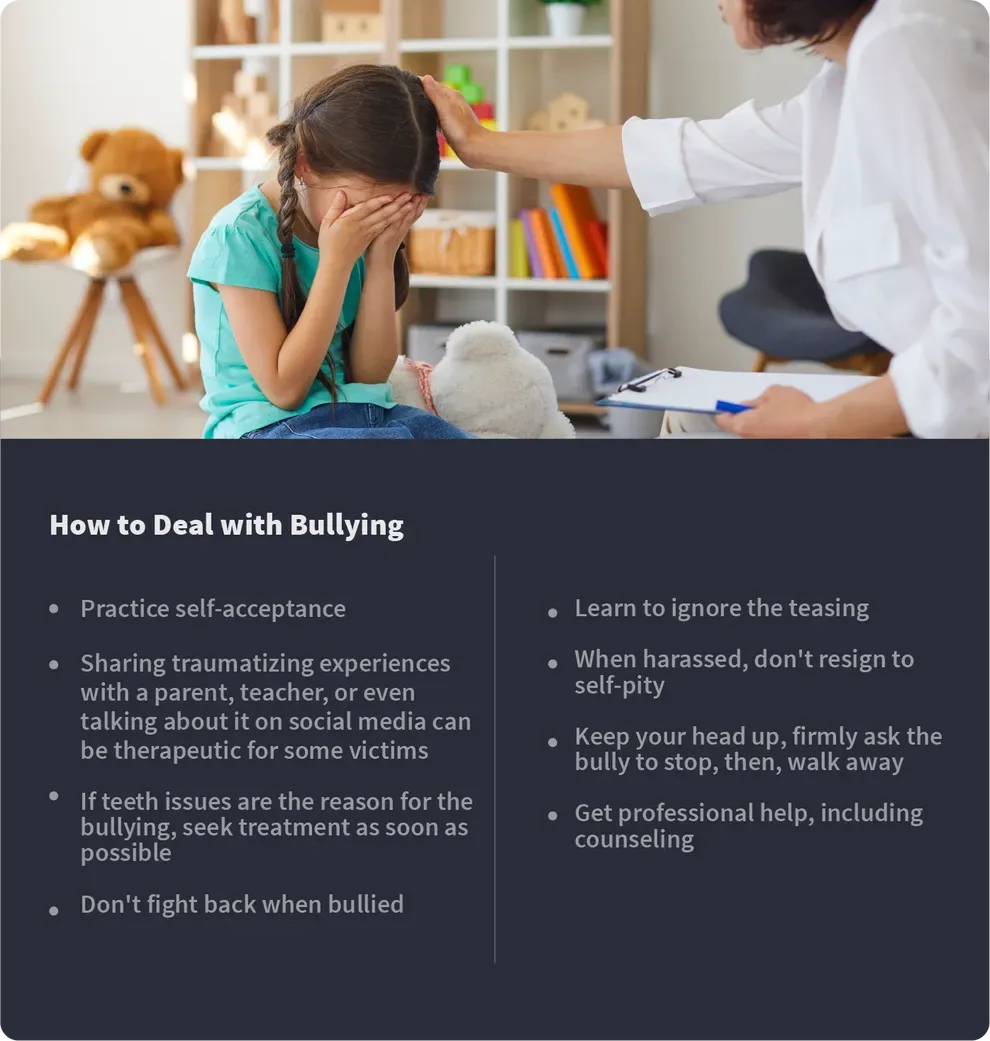Bullying Due to Misaligned Teeth & Braces
Table of Contents
- Dental Issues Children Deal With
- Teeth Issues & Bullying
- Braces & Bullying
- How to Deal with Bullying
- What to Teach Your Children
- Resources On Bullying
- References
Having bad teeth can affect anyone’s self-esteem. But the psychological impact is far worse on children with noticeable dental issues like crooked teeth.
Despite their tender age, many kids experience constant bullying because of their “abnormal” facial appearance. If your child has misaligned teeth, you’ll want to do everything possible to protect them from bullies at school or in the neighborhood.
Equally important, you’ll want to get them proper treatment to restore their confidence and radiant smile.
Teeth Misalignment and Bite Issues Children Have to Deal With
Malocclusion, or teeth misalignment, in children isn’t just a self-confidence issue. When a child with this dental anomaly closes the jaw or takes a bite, their upper and lower teeth don’t align properly.
Malocclusion is generally associated with crooked and overcrowded teeth. All these issues may impact the victim’s ability to speak, chew, or even breathe through the mouth. This misalignment can cause bite problems such as:
Overbite: The upper front teeth extend outward beyond the teeth in the lower jaw.
Underbite: The bottom front teeth extend outward beyond the lower jaw teeth.
Open bite: This is when the lower and upper front teeth don’t meet in the closed-jaw position.
Crossbite: With this misalignment, the upper front teeth sit lower behind the bottom teeth when the jaw is closed.
Bullying Because of Teeth Issues
Any child can be a victim of bullying. But research shows that children with conspicuous dental abnormalities are highly vulnerable to repeated negative actions by their age mates or classmates.
Whether the victim has misaligned, discolored, or crooked teeth, they’re constantly subjected to undeserved cruelty.
Common ways that kids like this are mistreated by bullies include the following:
Teasing
Abuse and being called names, such as “vampire”
Discrimination and rejection by peers, particularly during recess periods
Gossip about the victim’s “ugly” teeth or look
Physical aggression
Sadly, strangers, schoolmates and peers aren’t the only potential bullies to cope with day to day. The insensitivity and teasing can also come from family members who should be protecting the vulnerable child.
This constant harassment can have far-reaching effects on the child, including these:
Low self-esteem
Self-isolation
Depression and anxiety
Poor academic performance

Bullying Because of Braces
Many parents appreciate the benefits braces can offer their children, after speaking with a dentist. Aware of the stigma that these dental appliances carry among teens, some parents may hesitate to take their child to an orthodontist for treatment.
The kid with crooked teeth may experience this painful dilemma, too. Without braces, they’re deemed “ugly.”
With braces, the verbal abuse shifts to “geek” or “metal mouth.” And those are the kind monikers.
Some kids may be nervous about wearing braces, worried how it’ll affect their confidence or looks. Bullying at school makes it worse for them.
Still, other children are happy to get their braces. The stigma around these dental appliances shouldn’t stop you from getting your child the treatment they need if they have crooked teeth.
It’s best to take them to an orthodontist for checkup. Let the dentist have a look and determine whether your child needs braces.
Even if clear aligners will eventually be needed, these are not always the first line of treatment for malocclusion. Sometimes, teeth removal or jaw surgery comes before dental alignment.

How to Deal with Bullying
When you’re an easy target for bullying, you can stay safe or minimize the psychological toll by learning some coping strategies. Here’s how to deal with constant harassment, be it at school or in the neighborhood:
Practice self-acceptance if you can’t change your situation ever or in the foreseeable future.
Sharing traumatizing experiences with a parent, teacher, or even talking about it on social media can be therapeutic for some victims.
If teeth issues are the reason for the bullying, seek treatment as soon as possible. Keep in mind that the harassment may end once you wear braces, or it may persist.
Don’t fight back when bullied.
Learn to ignore the teasing. Giving a bully your attention encourages their misbehavior.
When harassed, don’t resign to self-pity – it’s what the bully wants. Instead, keep your head up, firmly ask the bully to stop, then, walk away.
Get professional help, including counseling.
What to Teach Your Children About Bullying
It’s heartbreaking for any parent to learn that their child experiences hateful harassment for whatever reason. While you can’t always accompany your child to school, you’re not entirely powerless.
There are things you can do to try and stop the bullying are at least help your child cope better. The victim, teachers, and the community have a vital role in this too.
Some helpful tips for parents to help kids deal with bullying include:
Teach your kids that bullying is wrong and unacceptable. Remember to lead by example at home.
Tell them that you’re always on their side. If they ever get bullied, it won’t be their fault.
Watch out for any signs of bullying since some children may hesitate to report it. If your child is unusually uneasy or not excited to join mates on the school bus, that’s a red flag.
If you suspect anything, calmly ask the child if they’re having any trouble at school. Let them know it’s OK to talk about it and you’ll help them get through it.
Resources On Bullying
If you know or suspect that your child is being bullied about their teeth (or for any other reason), there are resources to help you both deal with the situation.
If your child is being bullied at school, it’s important that teachers and other staff members know about the situation, so they can be aware of it and help to monitor and prevent incidents of bullying. If you feel they aren’t taking the problem seriously, you may need to escalate the issue to ensure your child is being protected.
Here are some tips for communicating with the school about your child being bullied, from Pacer’s National Bullying Prevention Center.
StopBullying.gov: Facts About Bullying
American Academy of Child & Adolescent Psychology: Bullying Resource Center - When to Seek Help for Your Child
MentalHealth.gov: Talk About Mental Health – For Parents & Caregivers
Pacer’s National Bullying Prevention Center: What Parents Should Know About Bullying
StompOutBullying.org: Bullying Harassment Notice (Forms)
Nationwide Children’s Hospital: Bullying Information for Parents
PacerKidsAgainstBullying.org: Redraw Your World Without Bullying (for elementary school kids)
State-specific anti-bullying resources are also available online, often under the state department of education or social services. These resources may include information about state anti-bullying laws, current anti-bullying protocols and programs, and contact information for those in need of assistance.
